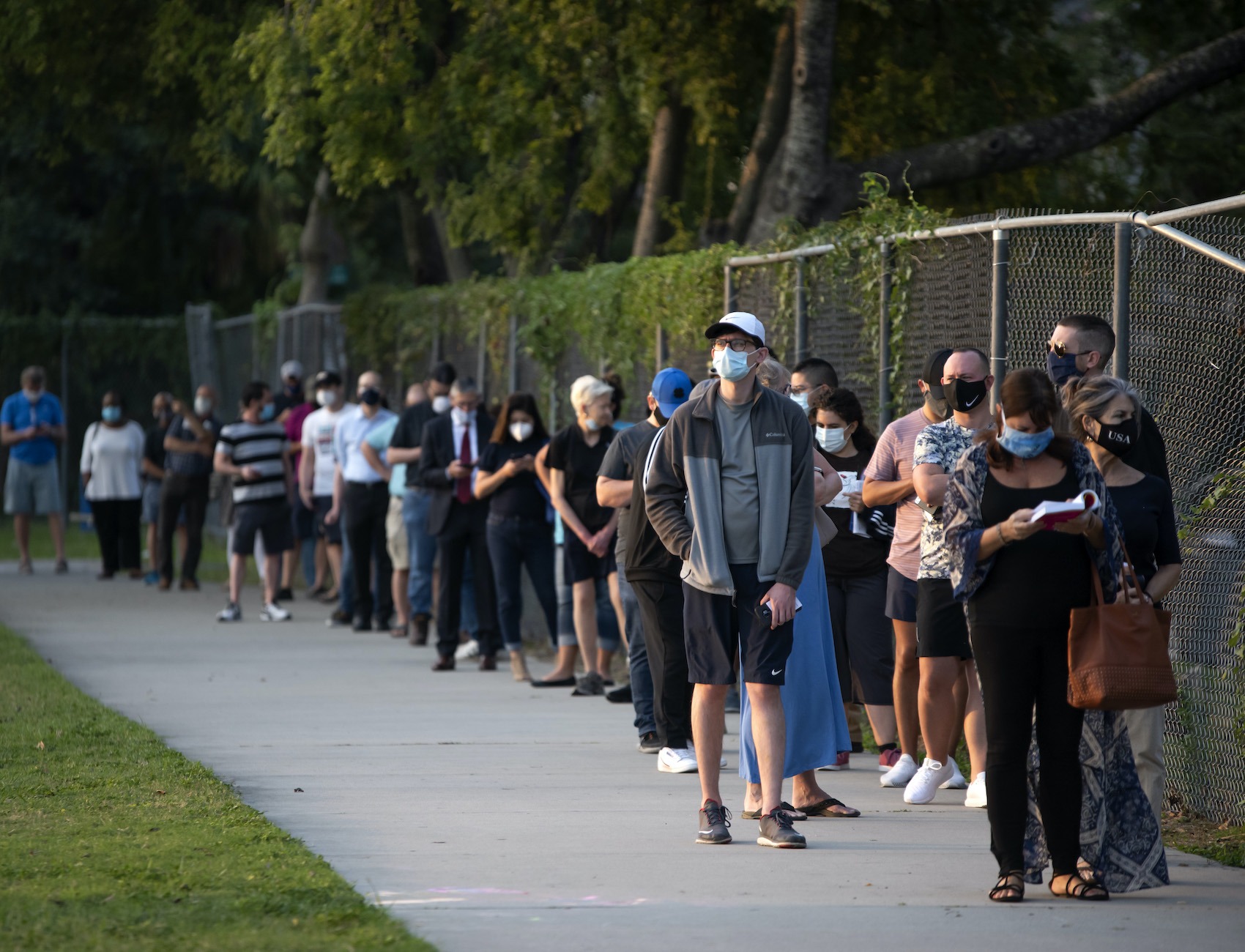‘Democracy Pressure-Tested’: Voter Suppression Efforts Underway As Election Nears
Efforts by elected leaders in several states are making it harder to get to the polls and fomenting misinformation about the election amid a pandemic.

In the lead-up to next month’s election, some states have made it more difficult to cast a ballot even as the COVID-19 pandemic continues to spread.
“We hold ourselves out as one of the greatest democracies on Earth and a barometer of that is whether or not we allow people to have a voice in our democracy,” Kristen Clarke, president and executive director of the Lawyers’ Committee for Civil Rights Under the Law, told The Appeal. “A pandemic shouldn’t be an excuse to keep people from being able to exercise their voice. This moment is one where we are seeing democracy pressure-tested.”
Early voters in several states have had to wait in long lines, in part because lawmakers there have closed some polling locations because of the pandemic. In Texas, some voters reported hours-long waits to cast a ballot in person on the first day of early voting. Atlanta’s first day of early voting had some voters waiting at the polls for as long as 10 hours.
Though Texas and Georgia are seeing larger than normal turnout—breaking their early voting turnout records—there are also fewer polling places today than in years past. An investigation by The Leadership Conference Education Fund found lawmakers in Texas closed more than 750 polling places statewide since 2012, nearly doubling the number of people expected to vote at each polling place in some heavily Black and Latinx counties.
Some states have tried to lessen the number of people congregating at polling places by expanding vote by mail, but Texas is one of five states that require an excuse beyond concerns over COVID-19, like not being able to get to a polling place, to cast an absentee ballot. On top of that, Governor Greg Abbott has restricted the number of secure ballot drop boxes to one per county. That move remains in legal limbo, as it has been struck down in state court and upheld in federal court.
A similar situation played out in Alabama as people attempted to cast their absentee ballots this week. On Monday, University of North Carolina law professor Carissa Byrne Hessick wrote on Twitter that her sister waited in line for more than six hours to cast her absentee ballot in Alabama. Hessick said that her sister, a nurse whose work involves administering COVID-19 tests, had to take off work to wait in line to vote.
“Anything that is a cost on voters, a burden on voters—whether that is a literal cost like the fines and fees of Florida’s pay to vote system for people with past convictions or the burden of driving farther to a polling place or ballot drop box—anything that increases those costs or that burden is going to have a negative effect on turnout and on participation,” Eliza Sweren-Becker, counsel in the Democracy Program at the Brennan Center for Justice, told The Appeal.
The proliferation of mail-in voting, in response to the COVID-19 pandemic, has also created some confusion among voters, which has been seized on by groups looking to sow discord over the election.
In California, the state Republican Party set up ballot drop boxes labeled as “official” that were not sanctioned by the state. Critics say these drop boxes could create confusion among voters who believe they are handing their ballots over to state and local government officials, instead of a partisan organization. The party has defied a cease and desist order from the state secretary and state Department of Justice, and officials with the party said they plan to keep the boxes up, but would remove the word “official.”
Republicans in Pennsylvania have also challenged a move to extend the mail-in voting deadline in their state by three days. On Monday, however, the U.S. Supreme Court left the extended deadline in place, voting 4-4.
Beyond making it harder to vote, attempts to undermine the legitimacy of voting have become more pronounced this election cycle, according to Sweren-Becker. President Trump has said on numerous occasions that mail-in voting is ripe for manipulation and would lead to “fraud like you’ve never seen.” But when a federal judge in Pennsylvania ordered the Trump campaign to provide evidence of voter fraud as part of a lawsuit the campaign brought to restrict mail-in voting in the state, the campaign produced only 14 instances of alleged voter fraud over the last 30 years.
Misinformation is also being used to attempt to intimidate people from voting. On Oct. 16, the Lawyers’ Committee for Civil Rights Under the Law brought a federal lawsuit against Jacob Wohl and Jack Burkman—two far-right conspiracy theorists—alleging that they produced a robocall meant to intimidate nonwhite voters and prevent them from casting a ballot. In the call, a woman falsely claims that information from vote-by-mail ballots will be used by police to serve outstanding warrants, debt collection agencies, and even the Centers for Disease Control and Prevention to force people to get a COVID-19 vaccine. Wohl and Barkman are also facing felony charges in Michigan over the robocalls.
In Florida, an unknown donor paid $500,000 to send out mailers in support of unaffiliated candidates in key state Senate races—an apparent effort to siphon votes from Democrats and increase the likelihood of Republican victories. A campaign adviser to state Senator Jose Javier Rodriguez, the Democratic incumbent in one of the races targeted, told Politico the mailers are “scare tactics designed to confuse voters.”
“The thing that is going to decide this election is the votes cast by eligible voters,” Sweren-Becker said. “To give in to that kind of disenchantment or to give in to the lack of confidence that this rhetoric intends would satisfy the voter suppression that is being sought out. Voters should cast their ballots this year with confidence.”
